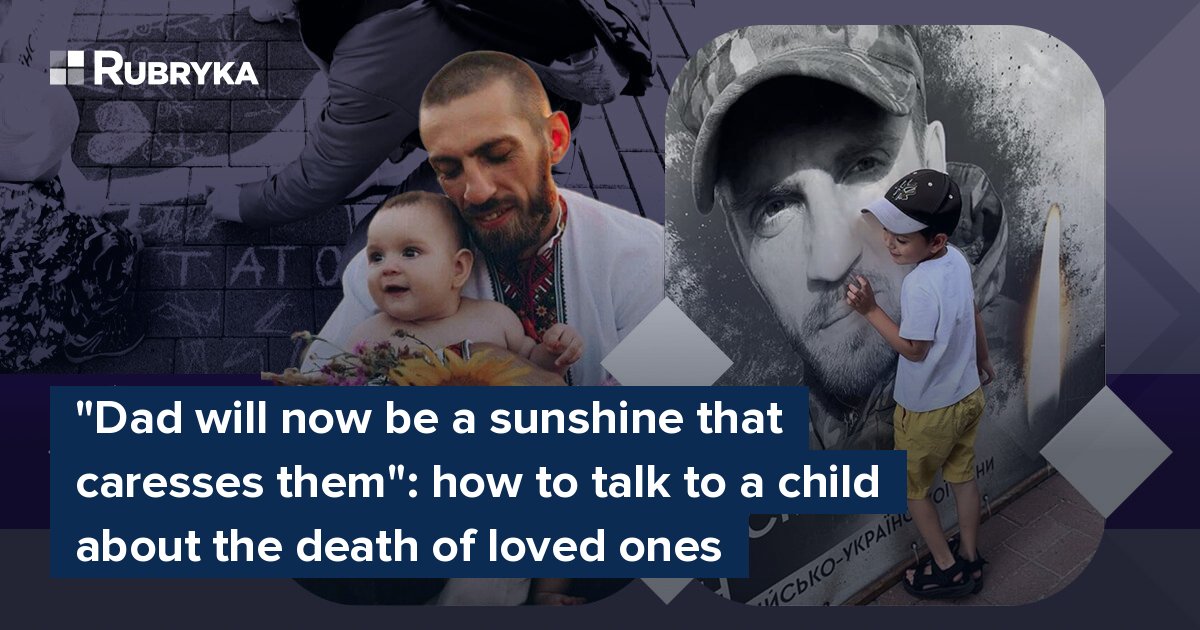
What is the problem?
Due to Russian aggression against Ukraine, thousands of children lost one or both parents. Younger children may not fully understand what is happening, but they also experience the grief of loss.
How to communicate with a child so as not to cause them even more trauma and, at the same time, not to inspire vain hopes?
Rubryka spoke about it with the mother of four-year-old Nazar, Tamara Yanina, who lost her husband in April 2022. We also asked family psychologist Inna Kanivets for professional advice.
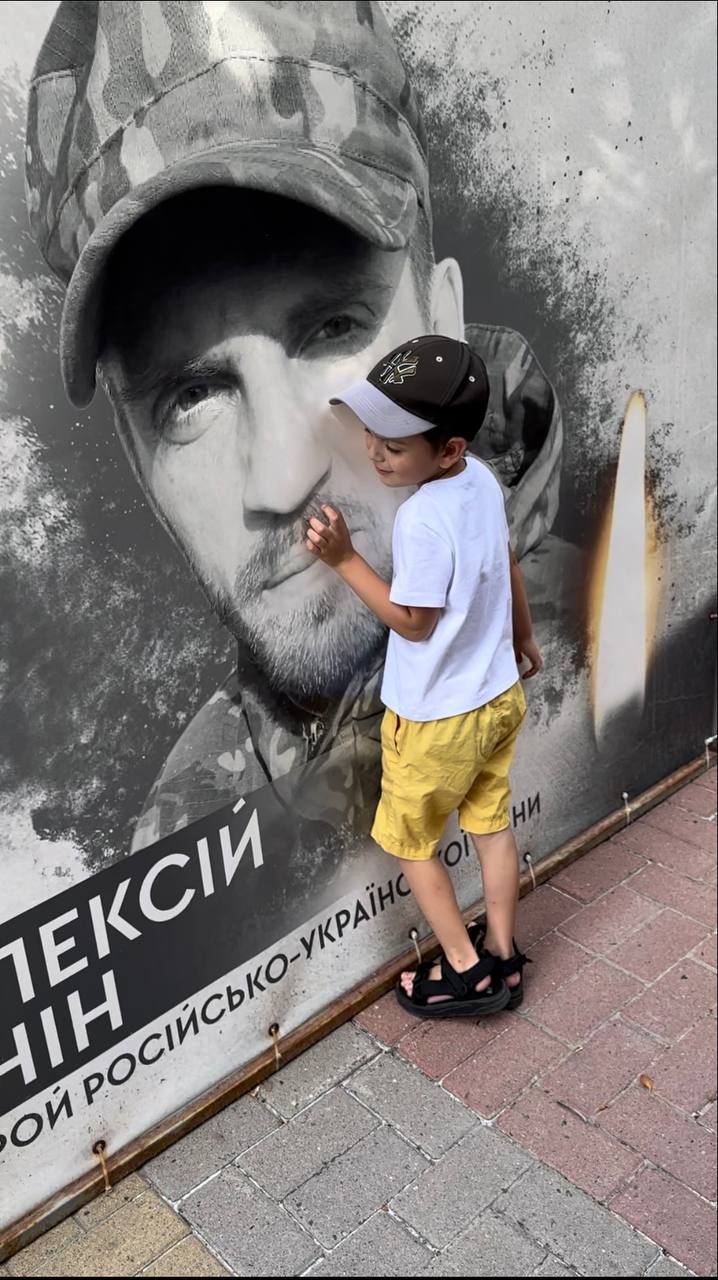
Nazar Yanin next to a photo of his deceased father, a soldier of the Ukrainian army. Photo from Tamara Yanina's archive
"I immediately felt: this is the one I was waiting for"
The story of Tamara and Oleksii
The couple met in the spring of 2017. At first, they spoke online because Oleksii had been serving in the Azov regiment then, and Tamara lived in Khmelnytskyi. After a month of communication, he was given a few days off and said: "Come to me to Berdyansk because if I go to you, we will lose time on the road, and we will decide whether we will be together or not."
The tickets were sold out during the Easter holidays, but somehow, Tamara managed to get to Berdyansk. "We stayed together for a day and a half, which was not enough, but when I got off the bus to him, I already knew that I was not mistaken: he is the person I was waiting for," Yanina shares the story of her feelings for Oleksii Yanin, Ukrainian kickboxing champion, Thai boxing world champion, who has been serving in the Azov regiment since the times of anti-terrorist operation (ATO) in the east of Ukraine.
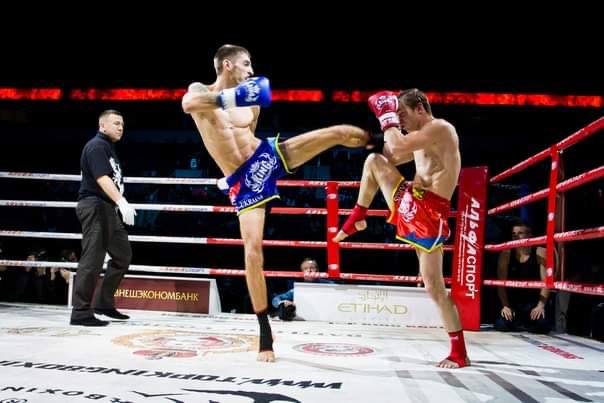
Oleksii Yanin (left) in the ring.
Yanina recalls that Oleksii proposed to her in the same year during a short vacation together at Pysanyi Kamin, a complex of picturesque rocks containing rock paintings, the oldest dating back to the Kyiv Rus times, where Tamara had long wanted to go.
"Of course, I said yes. I was over the moon with happiness, and already, on August 23, we got married," continues Yanina.
The wedding took place in the ancient Slavic style on Khortytsia, a Cossack island in Zaporizhzhia, where Oleksii was from.
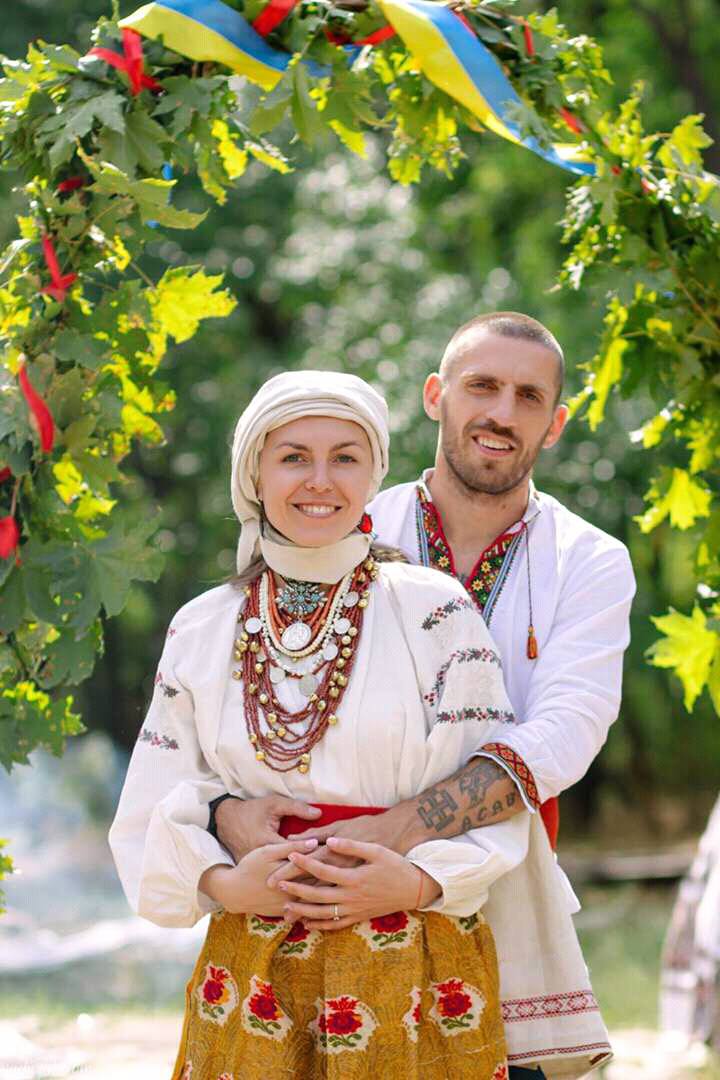
Newlyweds Tamara and Oleksii.
"The magus of the Native Ukrainian National Faith, Mr. Svitovyd, crowned us. In the broad masses, they are called pagans, but this is not entirely correct," Yanina is convinced. "It is an ancient Slavic faith. The wedding was wonderful. Since I collect ancient folk clothes and love them very much, I was dressed in the old dress of a Poltava bride, and I sewed a shirt for my husband with my own hands."
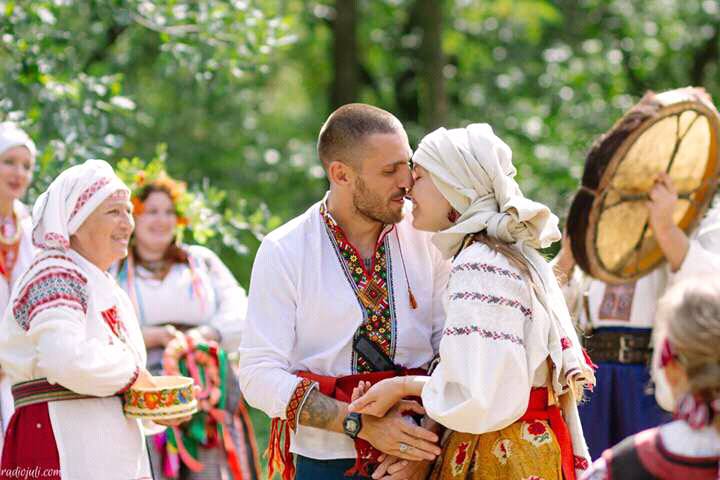
The ancient Slavic-style wedding of Oleksii and Tamara took place in Khortytsia.
The husband's vacation ended in a few days, and the young couple left. They saw each other once every three weeks when Yanina could come, and her husband was given the day off.
"Oleksii met our Nazarchyk in this world"
When Yanina was pregnant, she stopped going east to her husband because the journey took 20 hours, and she was worried about the future child. Because of the service, Yanin could not come often either. Yanina recalls that they saw each other two or three times during pregnancy: "I kept asking him to resign, but he couldn't because the contract had certain peculiarities. Oleksii came home, as we thought that for good, a month before Nazarchyk's birth."
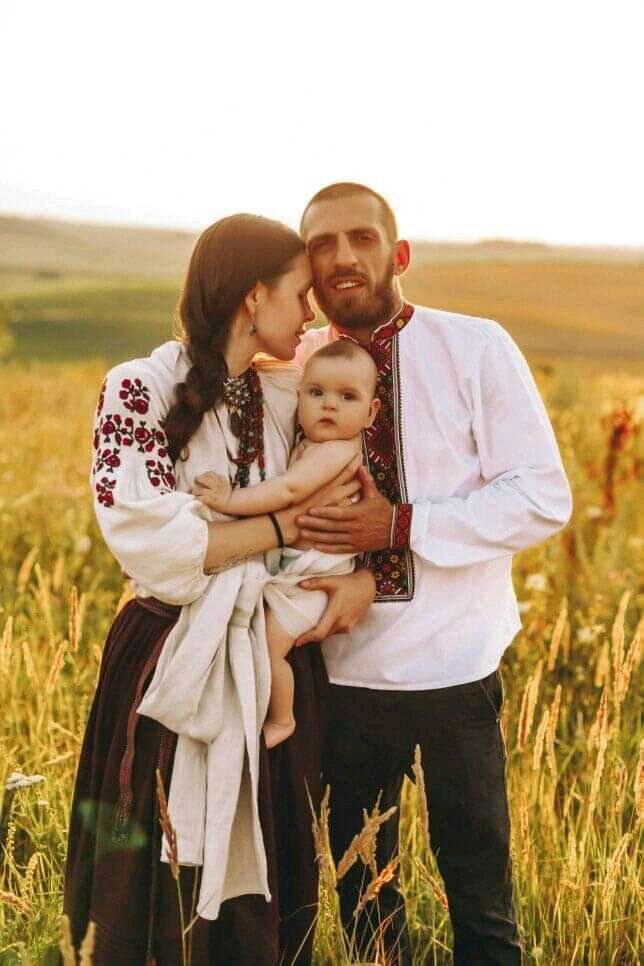
Tamara, little Nazar and Oleksii.
The husband was present at the birth and helped a lot because the birth was not easy.
Yanina adds: "I don't know how I would manage without him. He cut Nazarchyk's umbilical cord, actually welcomed him to this world."
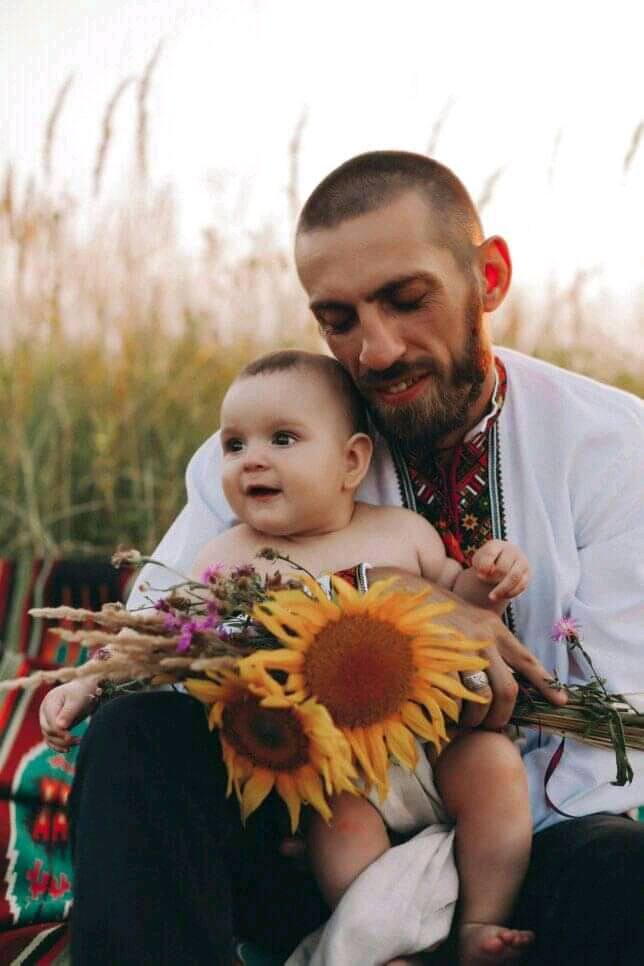
Father and son.
Oleksii stayed with his family for a year and five months and returned to the service in the Azov regiment. Tamara recalls that her husband complained that it was difficult for him, and he could not stay aside. He said that he had to fight and wanted to take revenge for the death of his comrades. He believed real men should be at war and wanted to protect his wife and son.

Oleksii with little Nazarchyk.
"He left," continues Yanina. "I no longer visited him because I was with a small child. He came to us less often at first, then more often. Just before he went to fight in the full-scale war, he visited us quite often."
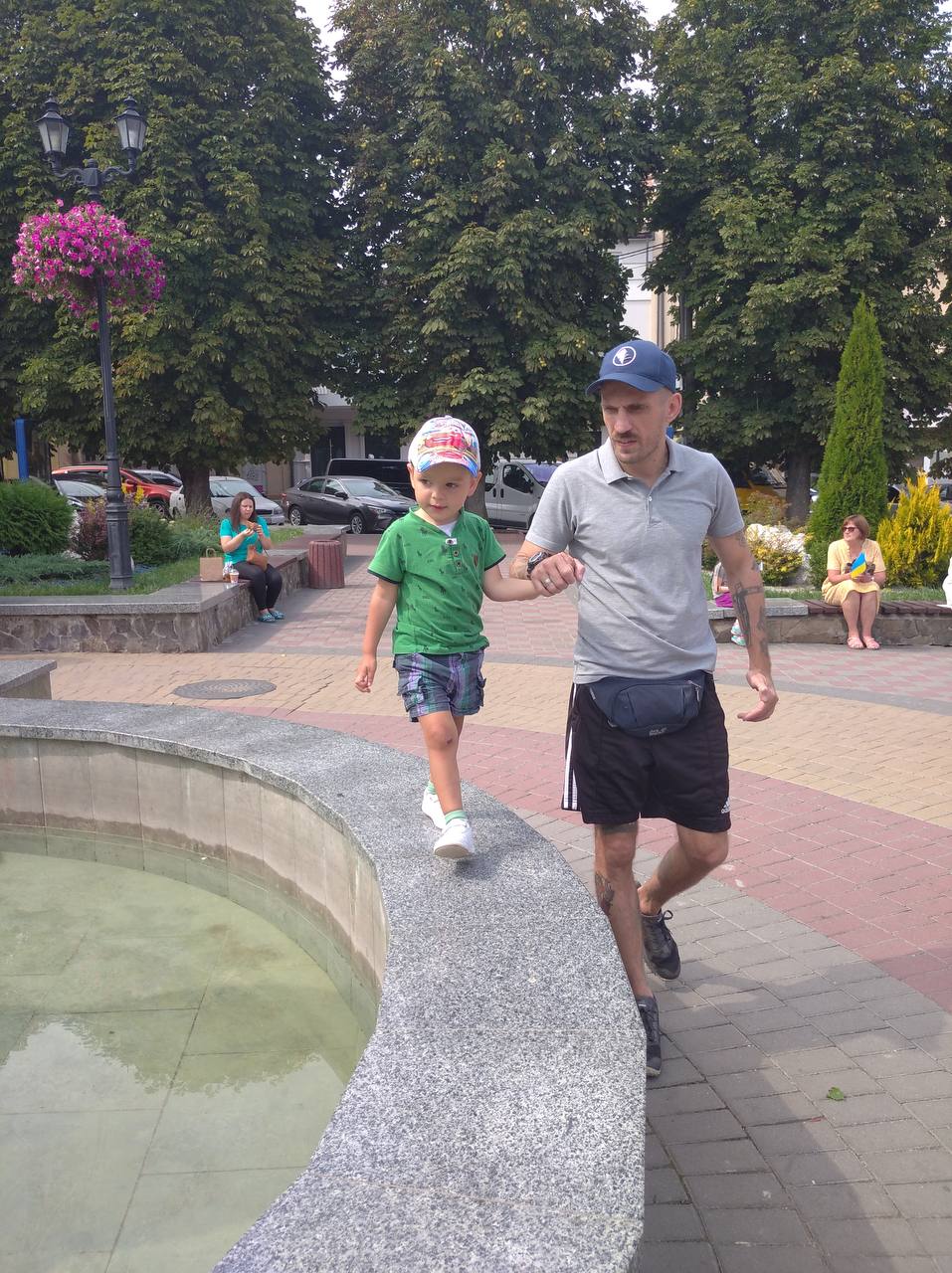
Oleksii loved spending time with his family, but the service was no less important for him.
On the morning of February 23, 2022, Yanin left for Mariupol. It was the last day they saw each other.
"They seem to have dissolved in water"
The story of the death of the Azov group, which included Yanin
"He died on the night of April 7, 2022. They were based on the Azovstal plant and were sailing to the opposite shore on a combat mission, to mine positions," Yanina tells about the circumstances of her husband's death. "But I found out about it later. For some reason, I lived as if in a fog and did not understand what was happening. Probably only this year I began to understand what happened and how."
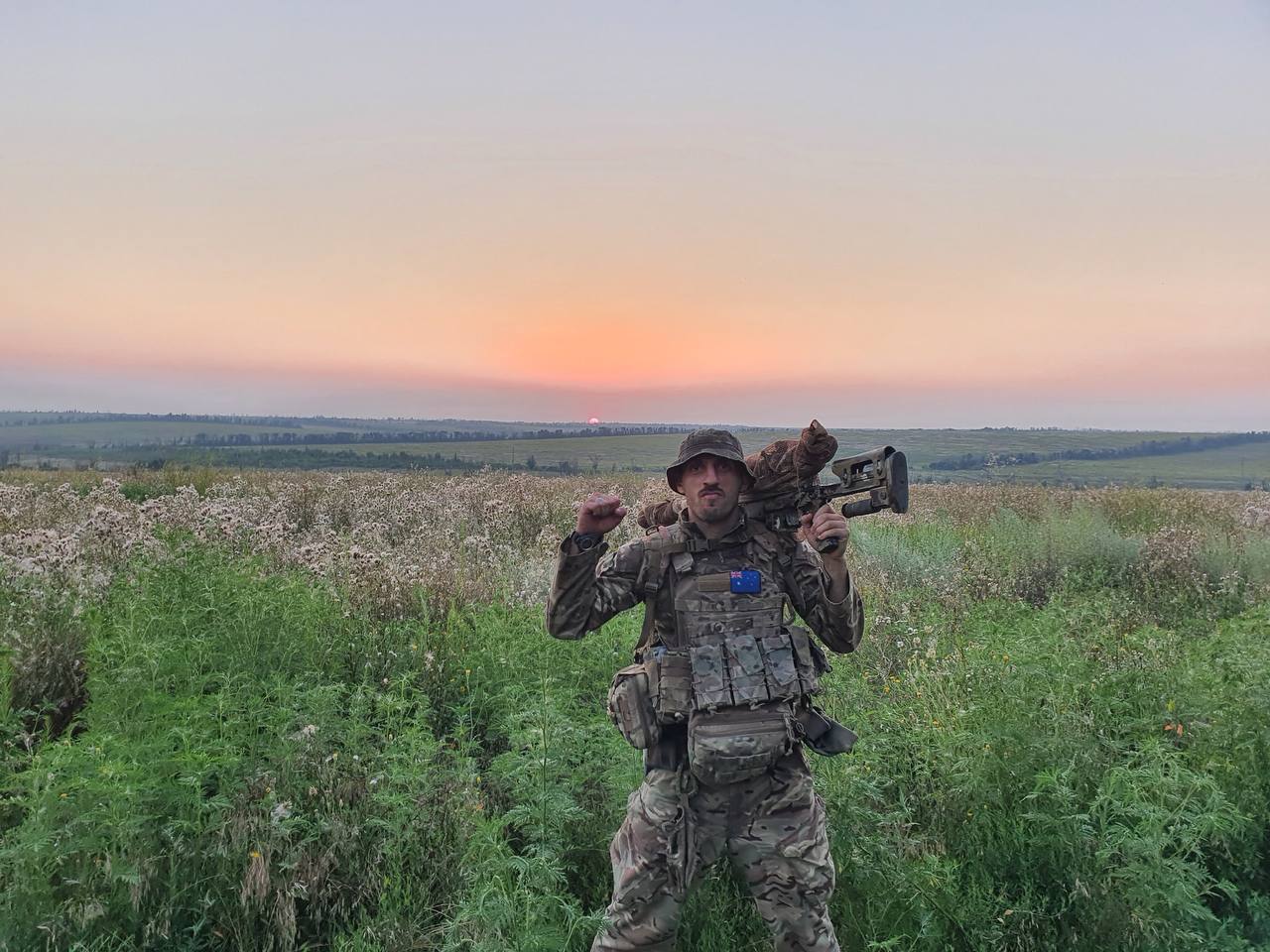
Yanin, during the service.
According to Yanina, the boat was fully loaded with ammunition. She definitely knows about six Azov soldiers on board, but there is a version that there were more soldiers, and not all of them were from Azov.
According to various reports, the boat was either 300 or 500 meters from the shore and perhaps even a kilometer away. Still, in any case, the woman says, it was already at the mouth of Kalmius, where the river flows into the sea — actually already at sea.

Oleksii Yanin (call sign "Indian") during his service.
"The Russians fired anti-tank missiles at them, but they did not hit the target the first time. The guys from the shore position called one of those in the boat, a guy with the call sign "Pashtet" on the radio. He reported that they were not hit, but then the enemy launched another anti-tank missile. The guys from the coastal position saw the explosion at sea, called "Pashtet," but no one answered. The soldiers from the opposite bank did not meet this boat," the widow recounts.

Nazar stands near the banner dedicated to his father.
The comrades immediately launched a quadcopter with a thermal imager because it was at night, but they found nothing. In the morning, they launched the copter again, and also in vain. "It seems that people just dissolved in the water," says Yanina.
"I am helpless with my child's pain"
Yanina shares what was the most difficult for her last year, especially in the first month of loss. She deliberately took her son to kindergarten so that he would not see his mother's tears and not worry while she herself was sobbing at home.
"I cried until May 2. And on May 2, something happened to me, and I thought: God, what about other widows who have nothing to live for, who became displaced people? I thought: My God, I have a house, I am on my land, I have friends, relatives, and support here. And how are the others? I became so scared for them, so I started to help somehow."
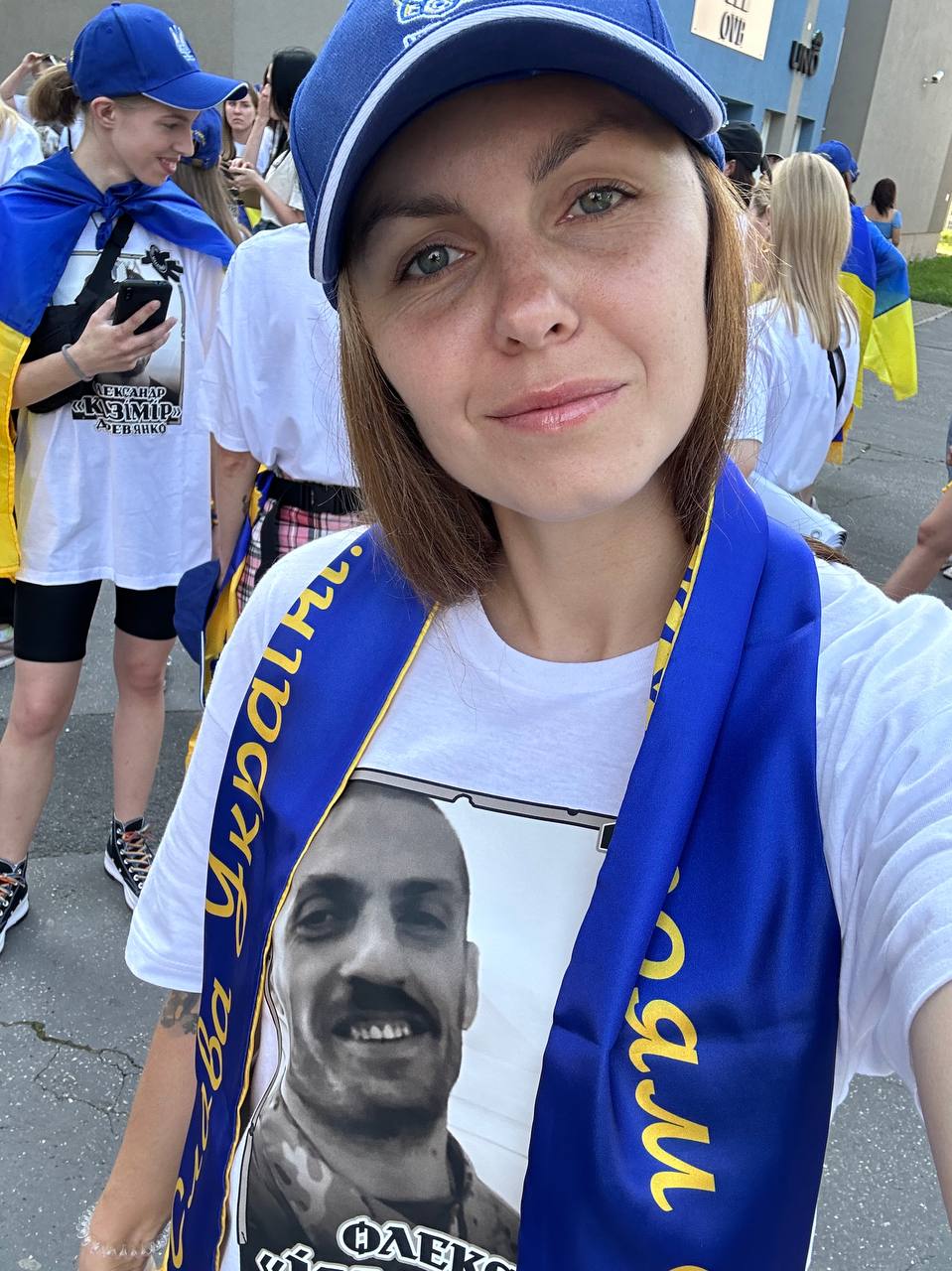
Tamara Yanina
Yanina wrote to the Azov patronage group, and thanks to social networks, she became a communicator between the families of the victims and those willing to help. Now, she realizes that helping other widows has become therapeutic for herself.
Now, when a year has passed, there is already a resource for understanding everything that happened in Mariupol, what happened to her husband, and his situation. Although the loss does not diminish, strength appears to simply live.

Tamara with her son near the memorial dedicated to the fallen soldier Oleksii Yanni.
"Nazarchyk, on the contrary, understood everything less last year, and now he is older, and this year is difficult for him. I must admit: it's harder for me, too, because I see his tears more and more often. I feel helpless and can only listen and comfort him," says Yanina.
She continues: "The other day, he was watching cartoons again, and out of nowhere, the child starts sobbing rhythmically: 'Mom, I want to see dad! I want to go to dad, and he left me! I want him to be alive. I want daddy to play with me. Mom, let's find a new dad.'"
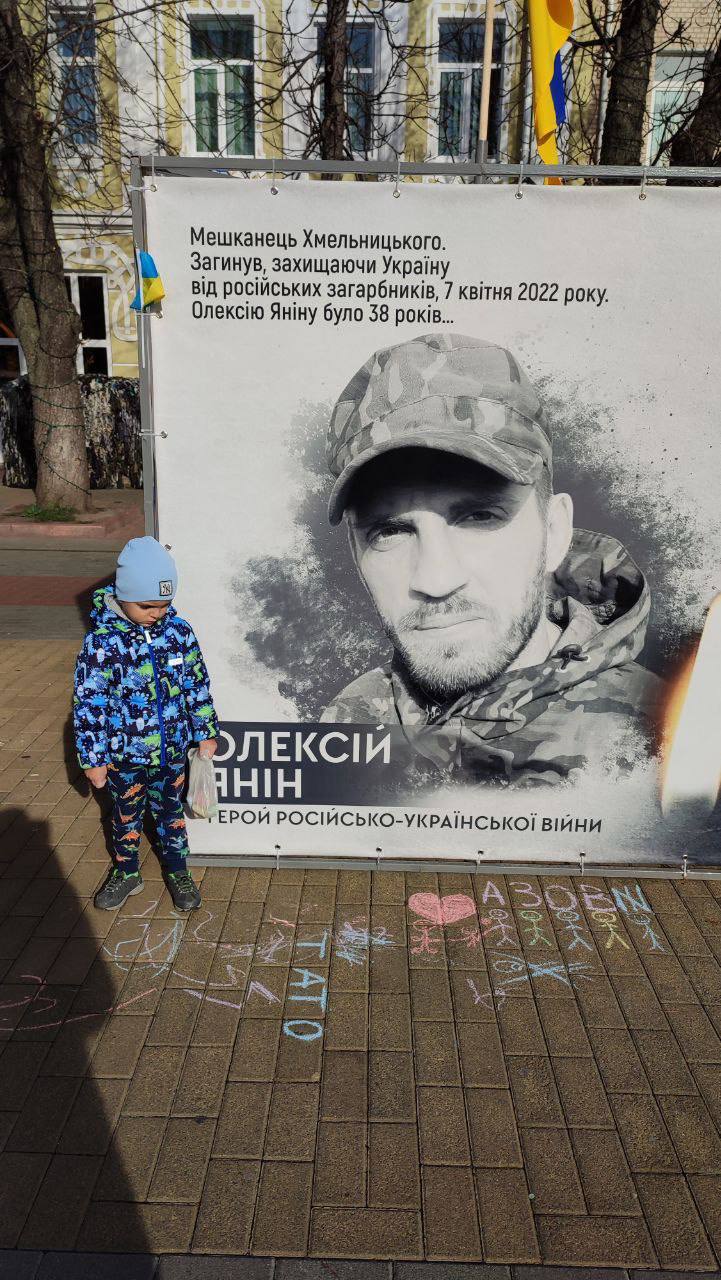
Nazar stands near the banner dedicated to his father.
Seeing your child's suffering is the hardest thing, says Yanina: "You understand that this little heart has to take these large doses of pain. And you cannot protect him from the pain of loss."
"I have the task of preserving the memory of Oleksii"
Tamara is convinced that being silent and telling the child that the father is gone later when they are five or ten years old is not an option.
Yanina says that regardless of how life develops and whether she will have a new love and a new marriage, she will preserve the memory of her husband for herself and people. After all, if not her, then who will do it?

Tamara puts flowers near the banner dedicated to the deceased husband.
"I will always be the wife of the fallen hero anyway. This is already an integral part of my life. My son should also know and remember that his dad is a champion and a hero. We did not choose these circumstances, but the circumstances chose us," Yanina states.
It was Oleksii's choice to be a soldier. He knew and understood all the risks, says the wife of the deceased soldier.
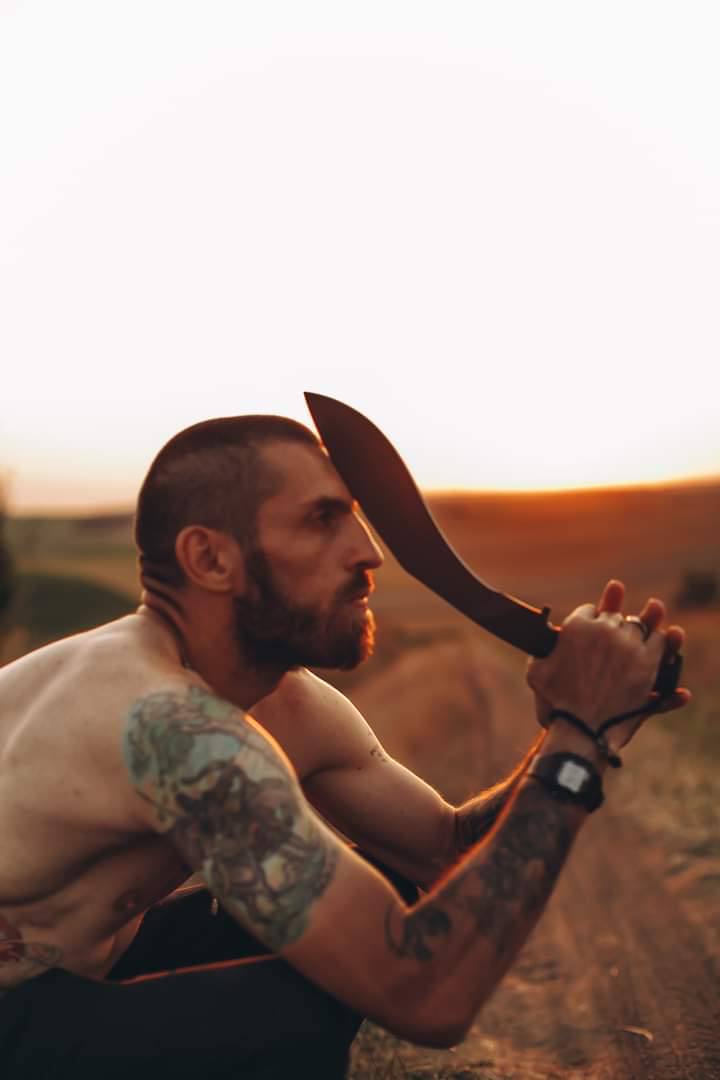
Oleksii Yanin.
"It is very difficult to accept a person's choice. You think you know better and want it to be your way. But a person wants differently. He needed that. It was good for him when the family was far away, and the service was close. Nothing can be returned or changed. I am grateful to my husband for everything," the widow shares.
What is the solution?
"Dad will always be the breeze that kisses him"
Yanina says that she tries to provide the child with complex information according to all the canons of psychology and pedagogy, in accordance with her son's age, because a three-year-old child does not know what death is.
"I tell him that dad is in the sky, and Nazarchyk looks out and looks for dad behind the clouds. He sees that other children are with their parents, playing or riding a bike with their father, but he doesn't have one. I told him a million times that his father did not leave him. He simply went to defend us: 'You see that there are sirens, you hear that bombs are flying. Thanks to dad, the Russians are not here. They want to take our house and your toys, and dad is protecting us."
Since Oleksii has no grave, the family often comes to the banner with dad's portrait in the center of Khmelnytskyi.
At first, it was tough that there was no grave, Yanina shares: "You needed it right away, when you had nowhere to cry, when you howled like a dog, when you didn't know where to go and were looking for the fifth corner, then you needed this grave."
Now she has learned to live without it because she has found her points of support, places where she can come: "My child and I have these cubes, we put flags there, then we will plant dad's tree. Sooner or later, there will be a memorial, and I hope we will have a place to come."
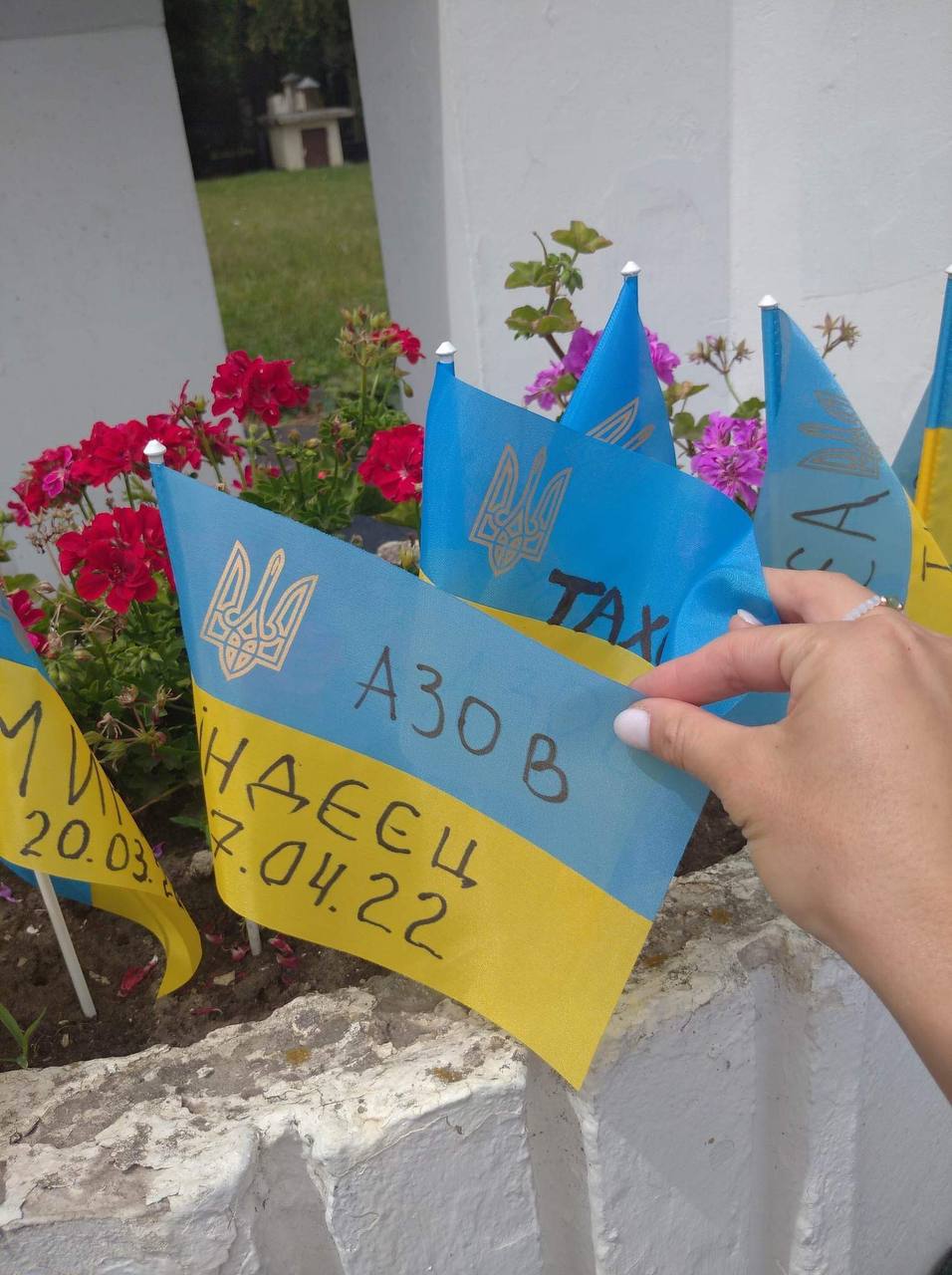
A flag commemorating Oleksii Yanin (call sign "Indian").
At the time of Rubryka's conversation with Tamara Yanina, the commemorative cubes were taken away for repair so that later, this improvised memorial, unfortunately, will be supplemented with banners in memory of the recently fallen soldiers.
"His dad will always be the breeze that kisses him, the sun that caresses him. That's what we came up with. If there was a grave, I wouldn't explain it all like that," shares Yanina. "Somehow, this is how we live, and we get away with it. I have to come to terms with it and just be there and support my son, feel sorry for him, understand, and listen because when there is a loss, how can it not hurt? He has it for life, and I have it for life. But thank God, we are alive and well. Thanks to my husband and everyone who defended us, we are not occupied. We have nothing to complain about."
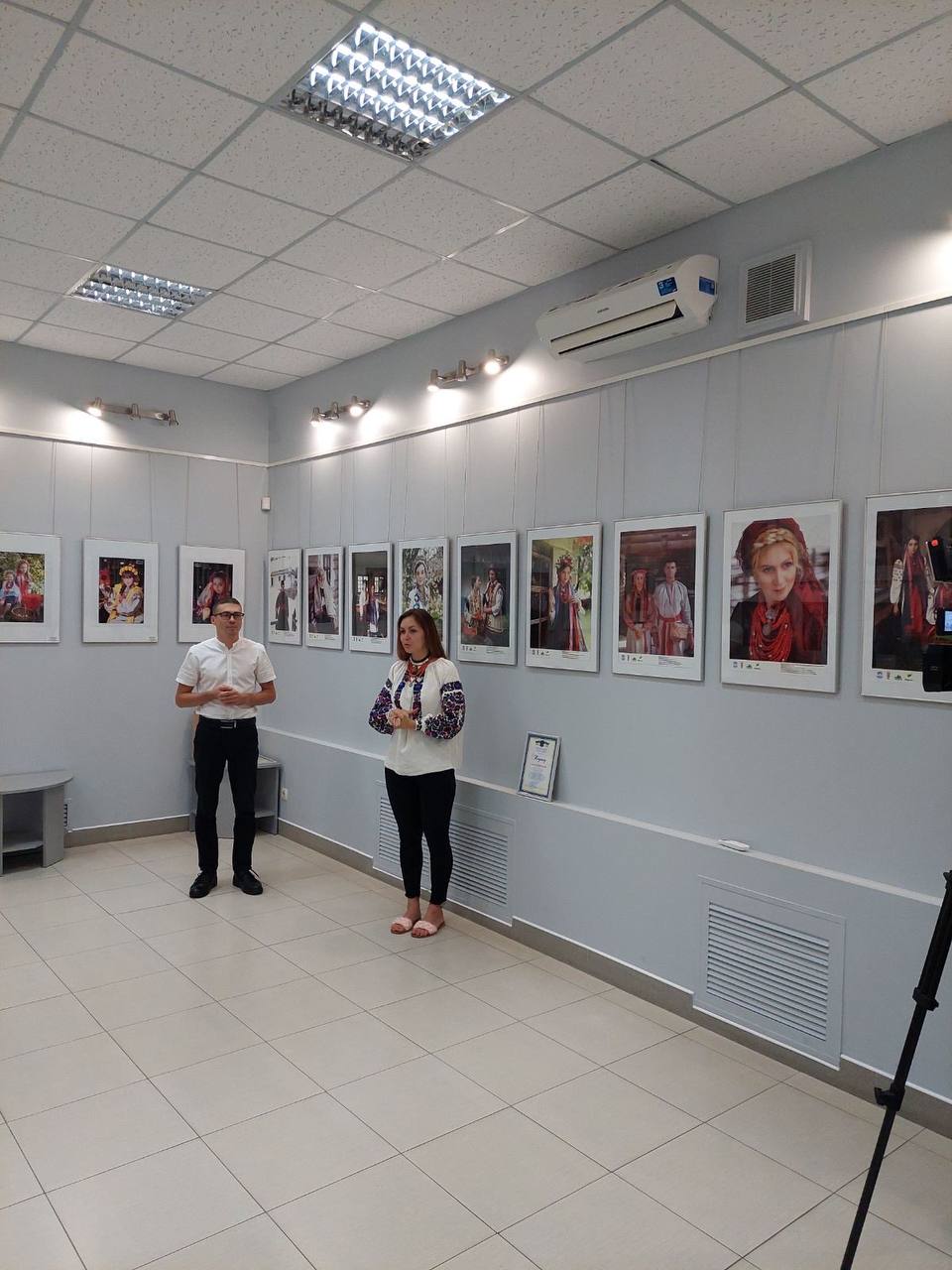
Recently, an exhibition of rushnyky (folk towels) from the collection of Tamara Yanina opened in Khmelnytskyi.
How does it work?
"We tell the truth, but we pay attention to the age limit"
Inna Kanivets is a practical psychologist with 13 years of experience specializing in family, child-parent relations, crisis, and trauma work. Among other things, she also helps families who have lost a father.
Her advice is as follows: "We speak the truth. First of all, we pay attention to how old the child is, and per age characteristics, we convey information."

Psychologist Inna Kanivets. Photo from the expert's archive.
Currently, Kanivets is counseling a woman who lost her husband, a military serviceman who left behind a four-year-old son.
"She says that the boy was not taken to the funeral. This is because it is emotionally difficult for the child; they do not understand what is happening, and the mother does not have the resources to explain. Now this situation is really correct," says the psychologist.
But then, according to the expert, the situation was not quite correct for the child. The child is surrounded by the family, where the mother, grandmother, and grandfather are crying. The child sees it. They do not understand what exactly is happening, but they understand that something is happening that causes a storm of emotions, Kanivets recounts.
When acquaintances meet on the street, for some reason, they hug mom and say words of sympathy. At the same time, the child says: "Mom, dad won't come home again!" And the mother says: "No, he will definitely come back."
"This is the wrong position," the psychologist is convinced. What is happening? Cheating is happening. One of our society's biggest problems is that adults put children in the position of, relatively speaking, "deaf, dumb, blind." But a child is a full-fledged member of society. Every person has the right to the truth, but this truth must be age-appropriate.
In this family, for safe interaction with the four-year-old son, the psychologist and the mother chose the following wording: the father performed tasks, very important, very useful, he did a lot, and now he will watch these tasks from heaven.
Kanivets explains that in this way, the child will understand that dad will not return and will not wait for him. And when it is hard for the child, the mother will be able to support them, saying: "You remember that dad is watching; dad supports and protects us." This is the support from the position of "we are close, we are together." Then, the child safely experiences the loss.
How should a child remember a deceased father or mother?
"This is not an angel. This is an ordinary person"
The psychologist is convinced that it is also not necessary to create unnecessary illusions; it is better to tell about a person what they really were: "It is not necessary to put a person on the point when they were the most courageous, the strongest, the most beautiful. They carried a high mission, but let's not devalue other service members, and let's not devalue human qualities because this was an ordinary person. That's why we tell the truth. Otherwise, later, there may be disappointment because someone will tell the unvarnished truth."
In general, why lie? This is an ordinary person who had a place on this planet, lived an everyday life, and had both positive and negative, and that's normal, adds the psychologist.
"We leave the injury in the state of a scar, not an open wound"
Kanivets says that in case of loss if it is difficult to cope with excitement or anxiety, it is important to consult a psychologist at different stages of grief.
When a person loses a loved one, everyone immediately becomes very involved, and the first stage is "Oh, we are all here for you," says the specialist. Then, the environment gradually begins to move away from the person, and they remain alone.
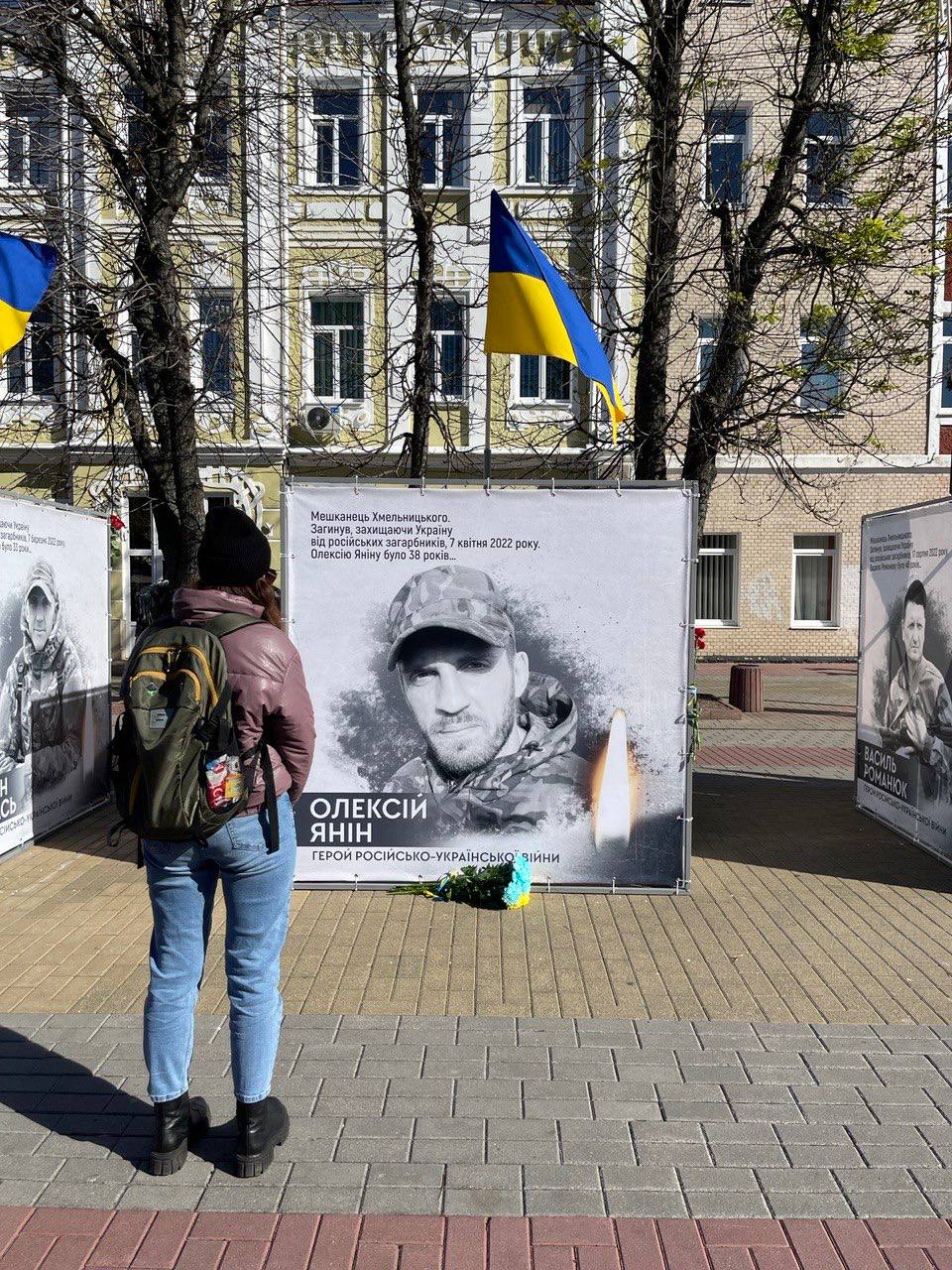
Banner dedicated to the fallen Azov soldier, Oleksii Yanin.
The psychologist explains that a contradiction arises: when a person goes through the grieving process, everyone comes to them with support and attention when they want to be alone. Then, when they want to talk, there is no one to talk to. That is why working with a specialist at the first and second stages is important.
Kanivets works according to an eight-step system of working with trauma. It involves gradually focusing on the search for a resource and planning for the future because life goes on.
"The wound remains, of course. The loss of a loved one is forever, but we leave this wound in the state of a scar, not an open wound," says the psychologist about her task in working with such clients.

"If I'm going to destroy myself now, did my husband die for nothing?" The "Darling, I Live" project helps women who have lost loved ones

"It is unbearably difficult to do alone what used to be done together": stories of businesswomen whose loved ones died at the front



